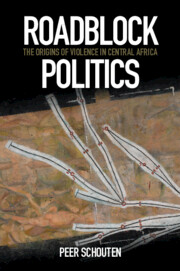Book contents
- Roadblock Politics
- Roadblock Politics
- Copyright page
- Epigraph
- Contents
- Figures
- Maps
- Tables
- Preface and Acknowledgements
- 1 Introduction: Sovereignty on a Shoestring
- Part I A Prehistory of the Roadblock
- 2 Hongo Polities (1830–1890)
- 3 Infrastructural Empire and Anti-colonial Resistance (1890–1960)
- 4 Ruination and the Revenge of Distance (1960–2000)
- Part II Roadblock Politics
- Conclusions
- Bibliography
- Index
4 - Ruination and the Revenge of Distance (1960–2000)
from Part I - A Prehistory of the Roadblock
- Roadblock Politics
- Roadblock Politics
- Copyright page
- Epigraph
- Contents
- Figures
- Maps
- Tables
- Preface and Acknowledgements
- 1 Introduction: Sovereignty on a Shoestring
- Part I A Prehistory of the Roadblock
- 2 Hongo Polities (1830–1890)
- 3 Infrastructural Empire and Anti-colonial Resistance (1890–1960)
- 4 Ruination and the Revenge of Distance (1960–2000)
- Part II Roadblock Politics
- Conclusions
- Bibliography
- Index
Summary
In the previous chapter, we saw how colonial administrations attempted to eliminate African roadblock polities and obtain exclusive control over mobility, relying on road building to enhance their grip. To understand contemporary roadblock politics, we need to turn to another set of connections: the negative dialectics between the disintegration of colonial transport networks and new forms of power and survival in its ruins. Chapter 4 shows how the story of Central Africa since independence is largely one of the demise of centralized control over logistical space, and with it, the return of the friction of terrain, to adopt James Scott’s vocabulary. In 1960, Congo entered upon independence as one of Africa’s most industrialized countries. In the wake of the Belgian colonial drive for logistical control, it boasted one of the continent’s most sophisticated transport networks. Yet half a century later, most of this road network was gone. Meanwhile the road network of the Central African Republic shrank by half. Concomitantly, the conditions necessary to manufacture power out of the friction of terrain once again fell into place, and within fifty years of independence, control over roads again became a central pivot in the region’s political economy of war.
- Type
- Chapter
- Information
- Roadblock PoliticsThe Origins of Violence in Central Africa, pp. 87 - 110Publisher: Cambridge University PressPrint publication year: 2022



